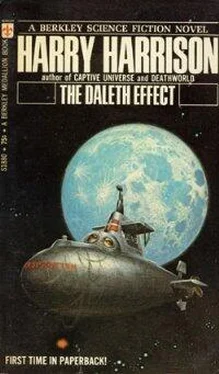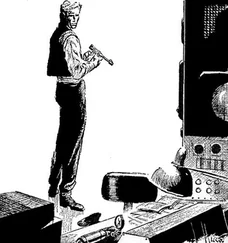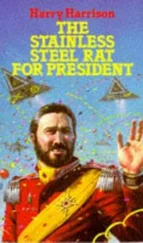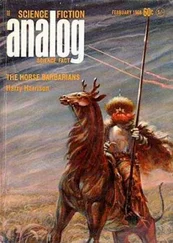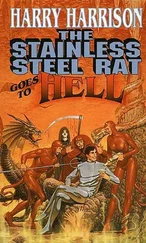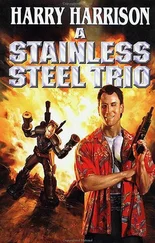“Stop!” Arnie said, shocked. “You don’t realize what you are saying. I did a traitorous thing, betraying my country and her trust in me and depriving her of the results oi the research that rightly belonged there. I went outside the law. If a scientist can be said to have an oath, I have surely violated mine.”
“I don’t understand—”
“I am sure you don’t. Your view is one-sided, unthinking, even more biased than mine. I admit my crime. Yet you offhandedly blame all scientists for all the sins of the world. You speak of atomic bombs. But what of atomic power plants and radioactive medicines? You blame scientists for inventing explosives, but don’t talk about the plastics that stem from the same chemical fundamentals. You speak of bacterial warfare, but not about the virus-killing medicines that came from the same research. You may try, but you cannot blame science and scientists for the world’s ills. We physicists may have made the atom bomb, but it was the government that financed it and elected politicians who decided to drop it. And the people at large seemed to have approved of the decision. Scientists don’t make war—it is people who do. If you try and blame the scientists for the condition of the world, you are just using them as scapegoats. It is far easier to blame another person than to admit one’s own guilt. Enough South Africans must enjoy being legal slave owners or their government would not stay in power. Remember what Machiavelli said, about the fact that a Prince could not rule in the face of the active opposition of the people. The Nazis did not exterminate the Jews—the German people did. People have the responsibility of their deeds, but they do not like the weight of this responsibility. They therefore choose to blame others. They say that the scientists, who invented bombs and planes and guns, are responsible for the state of the world today. But the people who elect the politicians who make the wars are blameless. Do you really think that it is that way?”
Nils was shocked at the sudden anger. “I didn’t mean it like that. I just said I admired—”
“Don’t admire a man who has betrayed his country’s trust in him. Even if my decision proves correct, I have still done an unforgivable thing.”
“If you feel this way, why did you leave Israel at all and come to Denmark? I know that you were born in Denmark and grew up there. Was that the reason why?”
The Martian silence closed in for long seconds before Arnie spoke again.
“Perhaps. Or perhaps because of faith—or hope. Or maybe because I am a Jew. In Israel I was an Israeli. But everywhere else in the world I am a Jew. Except in Denmark. There are no Jews in Denmark—just a lot of Danes of varying religious faiths. You were just three or four years old when the Nazis marched across Europe, so it is only history to you, another chapter in the thick books. They are monsters—demons in that they could unlock the evil in other hearts as well as their own. The people in the countries they conquered helped them fuel the ovens. The French police went out and arrested Jews for them. The Ukrainians happily fed the furnaces for them. The Poles rushed to see their Jewish neighbors cooked, only to be melted down themselves for their loyalty. Every invaded country helped the Germans. Every country except one. In Denmark the police were shocked to hear of the coming purge. They passed the word to others who were equally horrified. Cab drivers cruised the streets with telephone books, looking for people with Jewish names. Boy Scouts passed the warnings. Every hospital in the land opened its doors to tho Jews and hid them. In a few days every Jew who could be reached was smuggled safely out of the country. Do you know why the Danes did this?”
“Of course!” He clenched his large fists. “Those were human beings, Danes. That sort of thing just isn’t done.”
“So—you have answered your own question. I had a choice and I made it. I pray that I was right”
Arnie started down the hill, then stopped for a moment, “I was one of the people smuggled out to Sweden. So perhaps I am repaying a debt.”
They went down, side by side, to the light and warmth of the base.
Copenhagen
“There’s no point in our taking both cars,” Martha said into the telephone. “We can fight about which one later, all right… Yes, Ove… Is Ulla ready?… Good. I’ll be there in about an hour, I guess… Yes, that should give us plenty of time. We have those seats in the reserved section and everything, so there shouldn’t be any trouble. Listen, my doorbell just rang. Everything’s all set?… See you then.”
She hung up hurriedly and went to get her housecoat as the bell rang again. All she had to do was finish her face and put her dress on—but she wasn’t going to answer the door in her slip.
“Ja, nu kommer jeg,” she called out, hurrying down the hall. When she opened the door she stopped halfway, as soon as she saw the pendant bundle of brushes; a door-to-door peddler.
“Nej tak, ingen pensler idag.”
“You had better let me in,” the man said. “I have to talk to you.”
The sudden English startled her and she looked past the well-worn suit and cap, at the man’s face. His watery blue eyes, blinking, red-rimmed.
“Mr. Baxter! I didn’t recognize you at first…”
Without the dark-rimmed glasses he seemed a totally different man.
“I can’t stand at the door like this,” he said angrily. “Let me in.”
He pushed toward her and she stepped aside to let him by, then closed the door.
“I have been trying to contact you,” he said, struggling to disentangle the bundle of whisk brooms, hairbrushes, feather dusters, toilet brushes so he could drop them on the floor. “You have had the letters, the messages.”
“I don’t want to see you. I’ve done what you want, you have the film. So stop bothering me.” She turned and put her hand on the knob.
“Don’t do that!” he shouted, sending the last brush clattering against the wall. He groped in his inner jacket pocket and found his glasses. Putting them on he drew himself up, became calmer. “The films are valueless.”
“You mean they didn’t come out? I’m sure I did everything right.”
“Not technically, that’s not what I’m talking about. The notebook, the equations—they had nothing to do with the Daleth effect. They are all involved with Rasmussen’s fusion generator and not what we want at all.”
Martha tried not to smile—but she was glad somehow. She had done as she had been asked, and she had struck out. It was not her fault about the notebook.
“Well, can’t you steal the fusion generator? Isn’t that valuable too?”
“This is not a matter of commercial value,” Baxter told her coldly, a good deal of his old manner restored. “In any case the fusion unit is being patented, we can license the rights. What you and I are concerned with is national security, nothing less than that.”
He glared at her, and she pulled the edges of her houseboat more tightly around her.
“There’s nothing more I can do for you. Everything is on the Moon now, you know that. Arnie’s gone too—”
“I’ll tell you what you can do, and there’s not much time left Do you think I would have gone out on a limb with this rig if things were not vital?”
“You do look sort of foolish,” she said, and tried not to giggle.
Baxter gave her a look of pure, uncut hatred, and it took him a moment to control himself. “Now you listen to me,” he finally said. “You’re going to the ceremony today, and you will be going aboard the ship afterward and there are things we need to know about it. I want you to—”
Читать дальше
